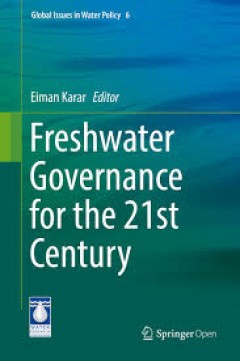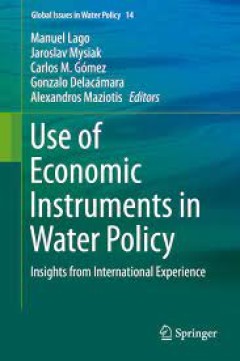Filter by

A City in Blue and Green The Singapore Story
This open access book highlights Singapore’s development into a city in which water and greenery, along with associated environmental, technical, social and political aspects have been harnessed and cultivated into a liveable sustainable way of life. It is also a story about a unique and thoroughgoing approach to large-scale and potentially transferable water sustainability, within largely ur…
- Edition
- 1
- ISBN/ISSN
- 9789811395970
- Collation
- X, 152 hlm; ill., lamp.,
- Series Title
- -
- Call Number
- -

Freshwater Governance for the 21st Century
The objective of this book is to broadly illustrate the key aspects of water governance, mapping the spectrum of decision-making from techno-centric and eco-centric approaches, to hybrid concepts and people-centric approaches. Topics covered include the challenges for water-governance models, the polycentric model, the integration challenge, water in the decision-making hierarchy, and the rise …
- Edition
- -
- ISBN/ISSN
- 978-3-319-43350-9
- Collation
- XXVII, 250
- Series Title
- 6
- Call Number
- -

Adaptive Strategies for Water Heritage: Past, Present and Future
This Open Access book, building on research initiated by scholars from the Leiden-Delft-Erasmus Centre for Global Heritage and Development (CHGD) and ICOMOS Netherlands, presents multidisciplinary research that connects water to heritage. Through twenty-one chapters it explores landscapes, cities, engineering structures and buildings from around the world. It describes how people have actively …
- Edition
- 1
- ISBN/ISSN
- 9783030002688
- Collation
- XIX, 435 hlm; ill., lamp.,
- Series Title
- -
- Call Number
- -

Use of Economic Instruments in Water Policy Insights from International Expe…
This book assesses both the effectiveness and efficiency of implemented Economic Policy Instruments (EPIs) in order to achieve water policy goals and identifies the preconditions under which they outperform alternative (e.g. regulatory) policy instruments and/or can complement them as part of complex policy mixes. The development of a consolidated assessment framework helps clarify (and where p…
- Edition
- -
- ISBN/ISSN
- 978-3-319-18287-2
- Collation
- -
- Series Title
- -
- Call Number
- -

The Water We Eat Combining Virtual Water and Water Footprints
This book pursues a comprehensive, multidisciplinary approach in order to analyze the relationship between water and food security. It demonstrates that most of the world’s economies lack sufficient water resources to secure their populations’ food requirements and are thus virtual importers of water. One of the most inspiring cases, which this book is rooted in, is Italy: the third largest…
- Edition
- -
- ISBN/ISSN
- 978-3-319-16393-2
- Collation
- -
- Series Title
- -
- Call Number
- -

The Shipping Industry, Ocean Governance and Environmental Law in the Paradigm…
This book examines the corpus of status quo environmental legal regime, geographical issues and redundant “stakeholder claims,” which persist in the Arctic. It examines multifarious theories relating not only to conflicting and opposing interests, but also to parties to whom the shipping industry should be accountable. The unique aspect of this book is the Corporate Social responsibility an…
- Edition
- -
- ISBN/ISSN
- 978-3-319-12541-1
- Collation
- -
- Series Title
- -
- Call Number
- -
 Computer Science, Information & General Works
Computer Science, Information & General Works  Philosophy & Psychology
Philosophy & Psychology  Religion
Religion  Social Sciences
Social Sciences  Language
Language  Pure Science
Pure Science  Applied Sciences
Applied Sciences  Art & Recreation
Art & Recreation  Literature
Literature  History & Geography
History & Geography